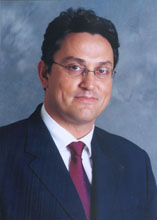|
€3.5 billion secured for Serbia's development
 |
| Goran Pitic |
Belgrade, Jan 19, 2004 - In an interview with the Belgrade daily Glas Javnosti, Serbian Minister of International Economic Relations Goran Pitic spoke about what the government has accomplished in the past three years after restoring cooperation with the international community and rejoining international financial institutions. The Serbian government website brings you excerpts from the interview.
On loans and donor assistance
In the past three years, loans and donor assistance were used for repairing the infrastructure and assisting the economy, primarily the private and social sectors. We are leaving a good heritage to the new government with no case of assistance allocation misuse and an efficient network for aid distribution. With international aid gradually decreasing and development lending rising, Serbia can spend €3.5 billion for development over the next two to three years. Since October 2000, Serbia has secured €5.3 billion in international assistance. A portion of €550 million was spent as humanitarian aid when citizens needed electricity, heating fuel or medicines, while €3.6 billion was used as development assistance. The country also spent a further €1.4 billion in agreed assistance for developmental projects. With around €1.1 billion pledged at the Brussels donor conference last November for Serbia's reforms and development projects in 2004, the new government will have some €3.5 billion at its disposal.
On fund allocation
The largest portion of aid was spent on top priorities - €475 million for the energy sector, including electricity imports and repairs of power plants; around €604 million for structural adjustment of the social, private, and financial sectors; €261 in EU aid for addressing social problems, including pensions, child allowances, and assistance to vulnerable households. The health sector has received some €94 million, while the transport sector was supported with more than €131 million.
On funding agreed projects in 2004
The new government will inherit a significant number of projects whose funding has been agreed with international organisations or donor countries willing to support those projects through further donations or favourable loans, provided that they are ratified by the new parliament. In 2004 alone, the European Investment Bank (EIB) will set aside €183 million and agree a further €300 for road building projects (€144 million), schools (€25 million), water supply systems (€26 million), and development of small and medium sized enterprises (€40 million). On the list of confessional, the so called soft loans, which have already been launched or agreed with the World Bank (WB), European Bank for Reconstruction and Development (EBRD), EIB, or donor countries, are projects for providing working assets, support to the development of the private and financial sectors, structural adjustment in the social sector, reconstruction of municipal infrastructure, reconstruction of Belgrade's public transport, education reforms, investment in health, and macro financial aid.
On projects under way
The most important projects funded with foreign aid, and which are already in progress, include: loans for structural adjustment in the social, private, and financial sectors totaling €160 million (from the WB); the rehabilitation of electric energy network in Serbia (€120 million from the EIB and EBRD); the CARD programme for projects on the local level across Serbia totaling $102.9 million; the reconstruction of the railway infrastructure, worth €70 million (from the EIB); the reconstruction of Belgrade's public transport, district heating system, and water supply systems, worth a total of €60 million (from the EBRD); the reconstruction of roads and the Belgrade airport, worth €50 million (from the EIB); the reconstruction of the Sloboda bridge in Novi Sad, funded with EU's €44 million; repairs and maintenance of heating plants in Belgrade, Novi Sad, and Nis, worth a total of €25.6 million (from the German government); and the repairs of the water supply systems in these cities also funded by Germany with €23.3 million; and a loan for small and medium sized enterprises worth €20 million.
On planned investment
The most significant projects to be funded from foreign aid are the Greek plan for the reconstruction of the Balkans, worth €184 million; the reconstruction of the road network in Serbia, worth a total of €95 million (from the EIB); the reconstruction of streets and tramways in Belgrade, totaling €90 million (from the EIB); and macro financial assistance from the EU totaling €90 million. The EBRD is to approve €75 million for road reconstruction projects which are already being defined, with another €56 million from the EU for upgrades of the Nikola Tesla power plant, €53 million from the EBRD for the Tamnava-Zapadno Polje coal mine rehabilitation, and flight control programmes already in preparation, worth €45 million.
|